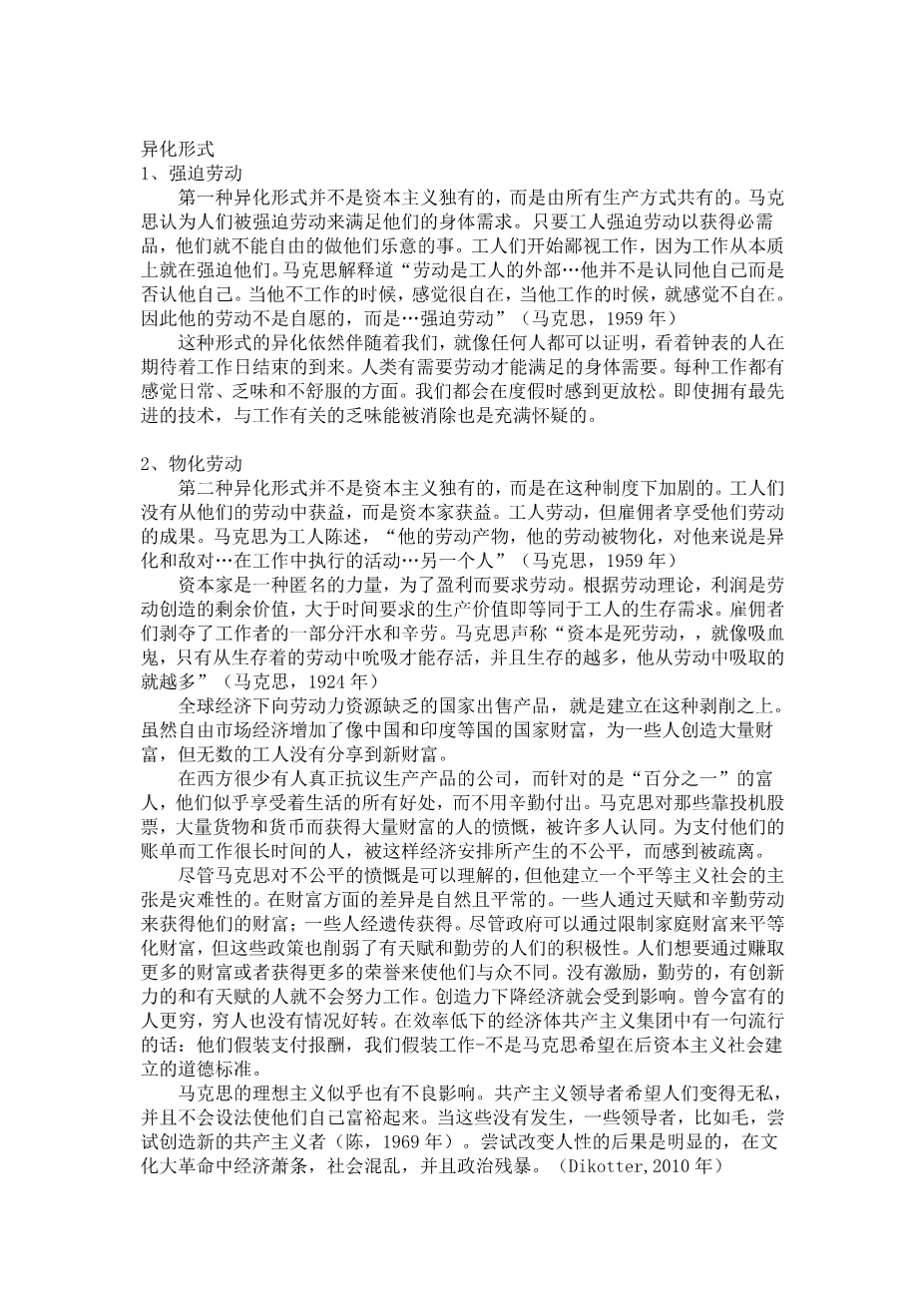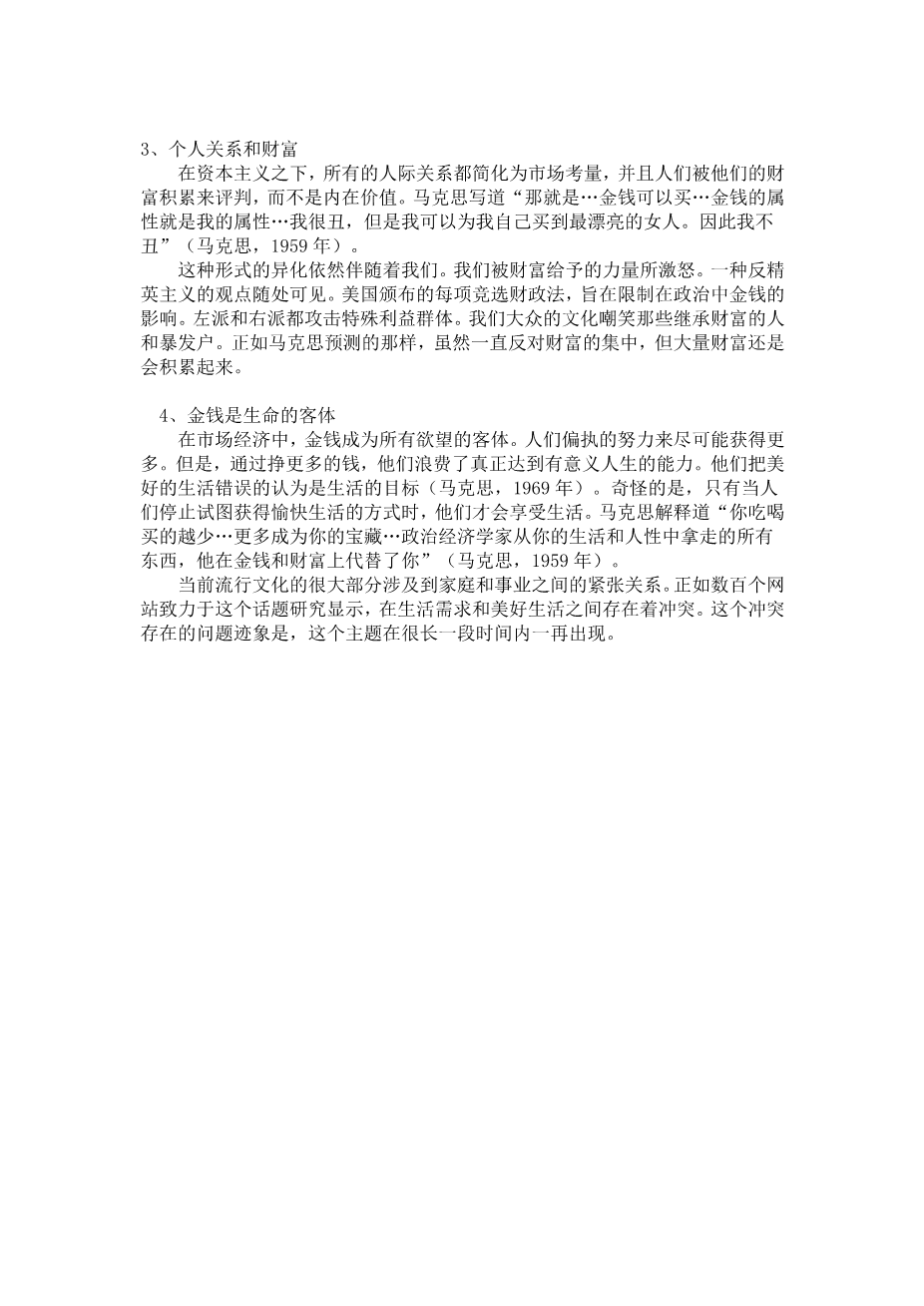Forms of Alienation
1. Forced Labor
The first form of alienation is not unique to capitalism, but is shared by all modes of production. Marx argues that people are forced to labor to satisfy their bodily needs. Insofar as workers are compelled to labor to obtain necessities, they are not free to do as they please. Workers come to despise work because it is forced on them by nature. Marx explains that “labor is external to the workerhellip; He does not affirm himself but denies himself. He feels at home when he is not working and when he is working, he does not feel at home. His labor is therefore not voluntary, buthellip; forced labor” (Marx 1959).
This form of alienation is still with us, as anyone can attest who looks at the clock, hoping the end of the workday is near. Human beings have bodily needs that require labor to fulfill. Every sort of work has aspects that feel routine, tedious, and uncomfortable. We all feel more relaxed on vacation. Even with the most advanced technology, it is doubtful that the tedium associated with work can be eliminated.
2. Objectified Labor
The second form of alienation is not unique to capitalism, but is intensified under that system. Workers do not reap the benefits of their labor; capitalists do. Workers labor, but owners enjoy the fruits of their labor. Marx states that for the worker, “the product of his labor, his labor objectified, is for him an alien, hostilehellip; an activity performed in the servicehellip; of another man” (Marx 1959).
Capitalist owners are an anonymous force that demands labor in order to turn a profit. According to labor theory, profit is surplus value created by labor done that is greater than the time required to produce a value equal to workersrsquo; subsistence. Owners expropriate a portion of the sweat and toil of those who work. Marx declares that “Capital is dead labor, that, vampire-like, only lives by sucking living labor, and lives the more, the more labor it sucks” (Marx 1924a).
The global economy that has shifted production to labor-rich poor nations is based on this kind of exploitation. While free market economics has increased national wealth in such countries as China and India creating in huge fortunes for some, countless workers do not share in the new wealth.
While few people in the West now protest against companies that actually produce things, there is antagonism aimed at the “One Percent,” the rich people who seem to enjoy all lifersquo;s advantages without breaking a sweat. Marxrsquo;s outrage at those who acquire great fortunes by merely speculating on stocks, commodities, and currencies, is shared by many people. People who work long hours just to pay their bills feel alienated by any economic arrangement that produces such inequities.
Although Marxrsquo;s indignation at inequality is understandable, his prescriptions for establishing an egalitarian society have been catastrophic. Differences in wealth are both natural and conventional. Some people earn their wealth through talent and hard work; others inherit it. While governments can equalize wealth by limiting family fortunes, those policies also undercut incentives for the talented and industrious. People want to distinguish themselves either by earning more wealth or obtaining greater honors. Without incentives, the industrious, innovative, and talented do not work as hard. Productivity decreases and the economy suffers. The once rich are poorer, but the poor are no better off. There is a popular saying among the population of the inefficient economies the Communist bloc: They pretend to pay us and we pretend to work hardly the ethic Marx hopes to establish in post-capitalist societies.
Marxrsquo;s idealism also seems to have ill effects. Communist leaders expect that people would become selfless and not seek to enrich themselves. When this does not occur, some rulers, such as Mao, try to create the new socialist man (Chen 1969). The consequences of attempting to transform human nature are visible in the economic scarcity, social dislocation, and political brutality of the Great Cultural Revolution (Dikotter 2010). 3. Personal Relationships and Wealth
Under capitalism, all human relations are reduced to market calculations, and people are judged by their accumulation of wealth, not by their inner worth. Marx writes “That whichhellip; money can buyhellip; that (I) amhellip; Moneyrsquo;s properties are myhellip; propertieshellip; I am ugly, but I can buy for myself the most beautiful of women. Therefore I am not ugly” (Marx 1959).
This form of alienation is obviously still with us. We are annoyed by the power that wealth gives. An anti-elitist sentiment is everywhere apparent. Every campaign finance law enacted in the United States aims at limiting the influence of money in politics. Parties on the left and right assail special interests. Our popular culture ridicules both those who inherit wealth and the crassness of the nouveau riche. Despite the continuing opposition to concentration of wealth, great fortunes have been amassed, just as Marx predicts.
4.Money as the Object of Life
In a market economy, money becomes the object of all desire. People make a monomaniacal effort to acquire as much as possible. By gaining more money, however, they squander the capacity to lead genuinely fulfilling lives. To make money, people spend their time acquiring instead of living. They mistake the preconditions of a good life for the purpose of life (Marx 1969b). Oddly, people enjoy life only when they cease trying to secure the means of a pleasurable existence. Marx explains that “the less you eat, drink, and buy bookshellip; the greater becomes your treasurehellip; Everything which the political economist takes from you in life and in humanity, he replaces for you in money and in wealth” (Marx 1959).
Much of current popular culture deals with the tension between family and career. As hundreds of websites dedicated to the topic indicate, there is a c
全文共6189字,剩余内容已隐藏,支付完成后下载完整资料


英语译文共 2 页,剩余内容已隐藏,支付完成后下载完整资料
资料编号:[453420],资料为PDF文档或Word文档,PDF文档可免费转换为Word


